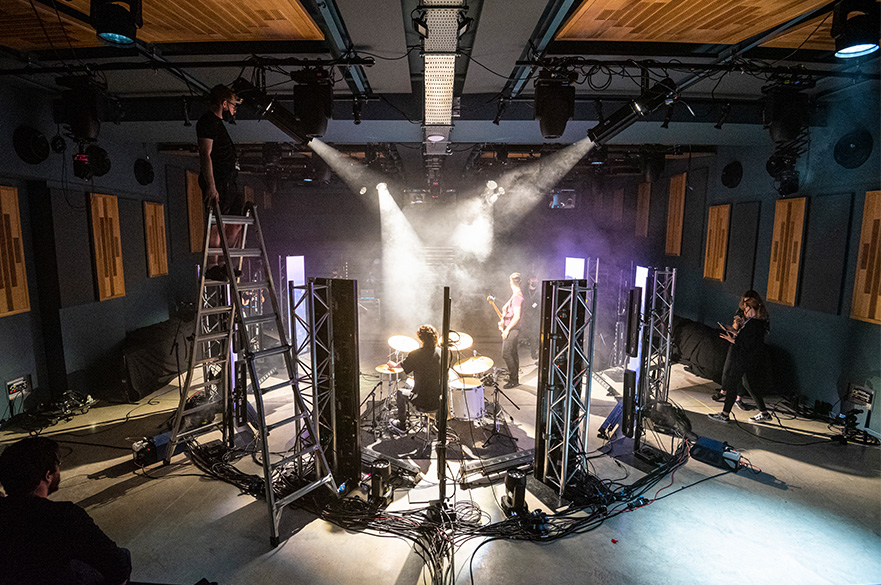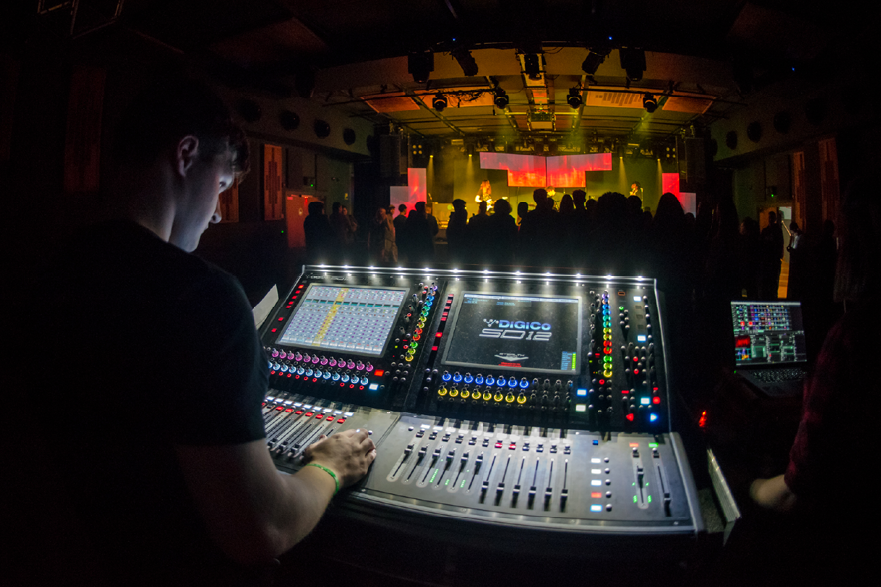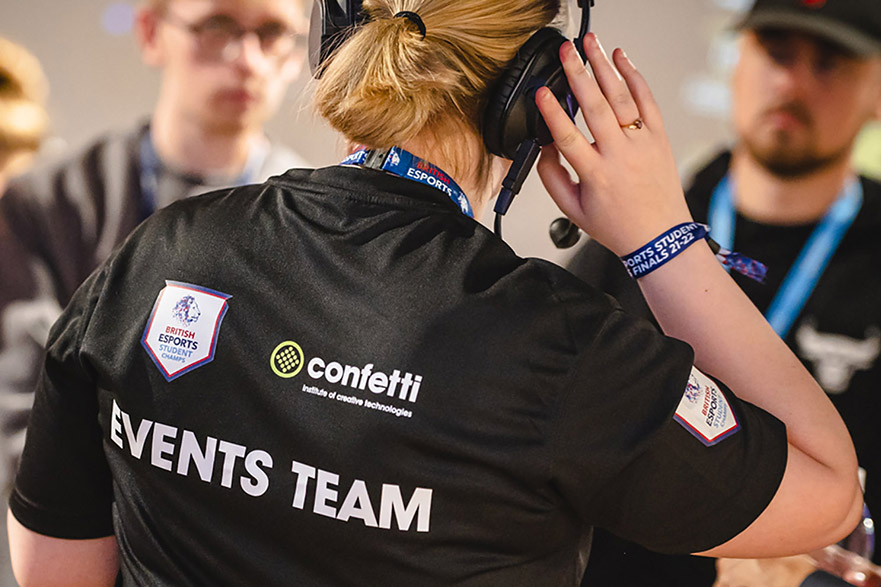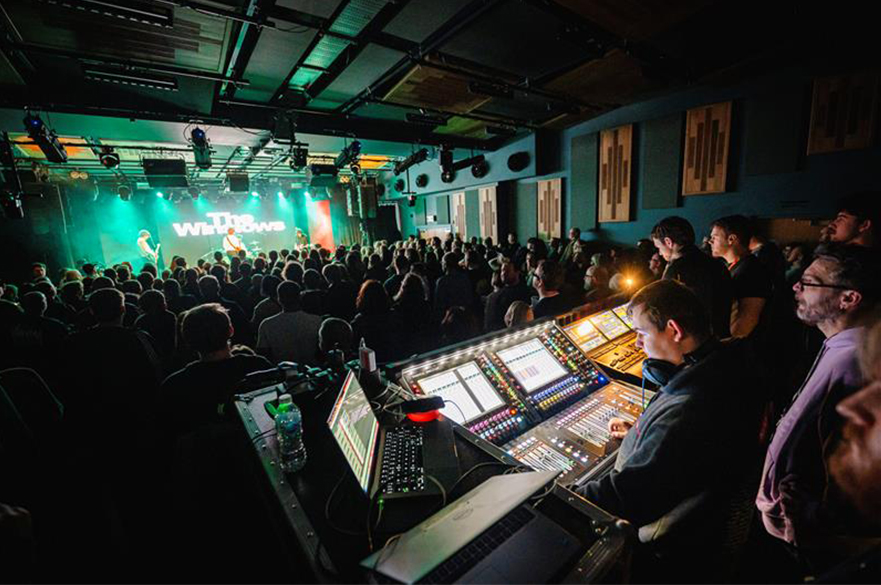This course is in Clearing
Offers from 80 tariff points
About this course
This BSc Event Production course, based in Nottingham, is for those wanting to forge an exciting career in the live event production industry.
You’ll work in a real-world live events venue, learning from our team of experts who are professionals in lighting design, live sound, broadcasting, live event planning, and live video installation and design, including LED video screen technology, and projection mapping pyrotechnics.
This is a heavily practical course, with a focus on gaining real-world experience, and underpinned by theory. You’ll learn about building lighting rigs and PA systems from day one as well as maintaining and repairing the equipment that you will be using on real world events.
Your tutors are all industry professionals still out there working in the industry whilst also being qualified lecturers – so you’re learning from people that live it! We set up cross-collaborations with other course disciplines such as Music Performance, Film Production, and Content Creation students.
What you’ll study
You’ll learn about a broad range of disciplines in the live and technical events sector, including lighting design and operation, live sound reinforcement, sound theory and acoustics, electrical principles, equipment maintenance and repair, live video technology including LED video walls and projection mapping, pyrotechnics safety, live broadcast technology, emerging technologies in the industry and live event planning. Industry and work-related opportunities will be gained through live projects, guest lectures and short work placements.
Lighting Technology (40 credit points)
Stage lighting is one of the most fundamental technologies in use to enhance the audience experience and support the performance of live events. This module will introduce you to the application of a diverse range of technologies in use, and their underlying scientific principles.
You will study the use of generic and intelligent lighting fixtures from a range of manufacturers, whilst also developing a working knowledge of distribution, dimming and control hardware and software. You will investigate current health and safety legislation and implement practical skills during industry practice focused workshops and live events. You will also gain knowledge of the historical developments in lighting technology and how that informs current industry standards and working practices.
Sound Technology (40 credit points)
This module aims to develop your understanding of sound reinforcement through the study of the theoretical and practical aspects of live sound. You will study the physical properties of sound and how they relate to sound reinforcement and will explore analogue and digital technologies. You'll put your knowledge into practice in practical live sound settings throughout the year.
Equipment, Maintenance and Repair (20 credit points)
An understanding of the principles of electrical systems is fundamental to anyone working within technical roles within the live event sector. It is of paramount importance that work in industry is carried out with electrical safety at the forefront. This module aims to equip you with a range of practical skills for fault finding, maintenance and repair of event technology. You will learn the fundamental principles of electronics, practical soldering techniques and investigate recognised industry standards and practices.
The Live Events Industry (20 credit points)
Working in the live event industry requires an awareness of the various types of job roles and career paths, and the historical, cultural and legislative changes that have helped shape the live event sector. This module encourages you to carry out research into the live event industry and analyse current trends and legislation, in order to gain a thorough understanding of your chosen sector. You will also develop your future employment prospects by engaging in basic work-related activities.
Production Design and Technology (60 credit points)
Production design focuses on all visual elements of an event, incorporating lighting and video technology, and often set design. With the continuous development of lighting and video technology, the roles of lighting or video designer often merge and the requirement to have skills in both areas of the industry is expected. In this module you will explore all aspects of production design and technology.
You will develop skills in lighting programming, video distribution systems, use of projection and LED screen technology, as well as looking at the design process, skills in 3D visualisation and the socio economic responsibilities of a designer.
You will also explore advanced lighting skills included the use of rigging and lifting equipment and calculating safe working practice when designing systems. You will develop a portfolio of skills in various different lighting and video design and operation software, which will then be put into practice in a final design project.
Advanced Sound Technology (40 credit points)
You will further your knowledge of sound theory and audio technology through the application of the design of different sound reinforcement systems. You will look at the connection between mathematical data to study the behaviour of sound in live venues, investigate loudspeaker designs and carry out sound measurements and calculations.
This module also has a strong emphasis on practical live sound engineering skills, and you will have the opportunity to develop and hone your skills in the live sound environment using industry-standard software and hardware.
Future You (20 credit points)
You are are the key to your own success! In this module you will investigate and develop your professional identity in terms of attributes, beliefs, values, motives, and experiences. You will develop professional integrity and a career identity.
This module encourages you to carry out research into employability and entrepreneurship and analyse current industry practices, job roles and technical skills required in order to gain a thorough understanding of the events sector. Throughout and during the assessment process you will actively partake in transformative practice, effective review and evaluation of yourself.
Broadcast for Live Events (20 Credit Points)
Live broadcast is an essential way for events to reach audiences in new and innovative ways. From low budget streaming applications that enable content creators to reach a wider audience base instantly, through to high quality, large scale live broadcasts of global events that require detailed logistical and technical planning; the market and consumer expectation of live broadcast is huge! Consequently, this challenging working environment requires technical staff who have the ability to create solutions that meet stringent technical requirements, as well as reacting and adapting to changing conditions as they arise.
As a successful engineer, your creative use of technology in this context should ultimately meet or go beyond the expectations of the audience, consumer and client. Throughout the module you will assume relevant roles to meet client, audience, performer and broadcast expectations of live events.
There is an emphasis on understanding technology to creatively compliment an event and the aim of this module is for you to research, design and implement technical solutions relating to the live broadcast environment culminating in a broadcast event.
Event Production Investigation (40 Credit Points)
This module provides you with the opportunity to undertake sustained investigation into a specific area of creative technology that builds on your previous knowledge, experience and skills acquired during levels 4 and 5. This module will allow you to explore critically a specific issue or area of personal interest within your chosen field allowing you to explore individual lines of enquiry connected to your career goals.
You will achieve this by undertaking a self initiated practical research project supported by tutor supervision. As part of this investigation, you will also enhance your abilities to communicate your findings with an audience and consolidate your skills in project management and self-directed work, both of which are vital for a career within the creative media industries.
The module serves to acquaint you with the key skills and practices required to undertake and complete an independent research project. The module will also enable you to understand the role of Intellectual Property (IP) in supporting the creative economy and how you can identify and legally protect your ideas and innovations. The module will offer an insight into how you can manage and license your IP and
what you do if someone else uses your ideas or without your permission.
Emerging Technology (40 Credit Points)
The live events industry is a fast paced, ever-changing world and your success in industry is dependent on your ability to not only adapt to changing commercial and consumer priorities, but also to develop innovative approaches to staging live events. Therefore, this module challenges you to research, design and implement a range of emerging technologies within the live events sector in order to develop an innovative solution in response to a client brief.
Developing the Practitioner (20 Credit Points)
The aim of this module is for you to examine the range and variety of creative working methodologies in order to develop your role as an evolving practitioner. Through research and theory you will gain a highly developed conceptual understanding of contemporary live event practice.
You will attend a series of practical workshops and seminars, the purpose of which will be to expand and challenge pre-existing ideas and perspectives. The brief will be initially offered by the ‘client’ and through practical application, the work will evolve collaboratively to produce an original and imaginative event or series of events. At specific points during the process you will be expected to present your evolving concept with the justification of theoretical research which will inform the assessment procedure.
We regularly review and update our course content based on student and employer feedback, ensuring that all of our courses remain current and relevant. This may result in changes to module content or module availability in future years.
How you're taught
Teaching and learning will take place in a custom-built live events production space and a range of bespoke IT suites and classrooms. You’ll learn on industry-standard equipment with training from experts in the field of live audio, lighting and live video production.
The aim is to further develop your practical, technical and critical thinking skills and to work on the appropriate deployment of analysis and enquiry techniques associated with the live events industry, whilst working on a combination of controlled, in-house activities and real-world client projects.
Classes will be a mixture of technical lectures and practical workshops where you’ll explore the core scientific and mathematical principles of the module subject areas. In addition to the theoretical underpinning of the subject area, the teaching and learning activities will predominantly focus on developing your practical skills associated with live events. You’ll gain knowledge of lighting and sound systems to develop productions that utilise these skills in innovative ways.
Showcase
You will be given the opportunity to exhibit your work during your time at NTU to members of the creative industries.
Careers and employability
Your time at NTU doesn’t have to stop once you finish your undergraduate course. Choose to continue your studies on our postgraduate degrees that can help you further develop your skills and obtain the experience you need to get a head start in your career.
Typical job roles in industry might include:
- Live sound engineer
- Lighting designer/operator for live events
- Production manager
- Live broadcast engineer
- Live video technician/operator.
All of the above may find you working in live music, theatre, festivals or corporate events in the UK or touring overseas.
YouFirst – working with our Employability Team
Studying a degree at a popular university has many benefits, none more so than having access to a large employability team.
Our friendly, experienced careers consultants will work closely with you at every stage of your career planning, providing personal support and advice you won't find in a book or on the internet. You can benefit from this at any time during your studies and up to three years after completing your course.
Campus and facilities
You’ll get to learn your trade in facilities that operate public-facing events every week of the year.
In Metronome you’ll find some amazing facilities, jam-packed with recording studios, rehearsal rooms, performances spaces, and a 400-capacity venue. You will be using industry standard equipment, the kind of equipment you’re going to see the professionals using. That’s audio equipment from Allen & Heath, L’Acoustics, Digico, Martin Audio, Nexo, Shure and Audix. Lighting from Avolites, MA, Martin, Robe and Clay Paky.
Providing more event experience opportunities is Confetti X; a 14,000 sq ft complex kitted out with world-class facilities and technology for esports and other emerging technologies. It’s here where you’ll have the chance to work on esports tournaments and a range of corporate events.
Entry requirements
This course is in Clearing
Looking for a place in Clearing? We are accepting application and would love to hear from you!
UK students
This course is in Clearing
Looking for a place in Clearing? We are accepting applications and would love to hear from you!
Clearing requirements
From 80 UCAS tariff points from up to 4 qualifications.
To discuss our entry requirements and see what we can offer you, call us now on +44 (0)115 848 6000. Alternatively, if you already have your qualifications, apply online via our Clearing Application form.
Preparing for results day? Beat the queue and sign up for NTU Priority for up-to-date information about all things Clearing. You’ll get an offer ahead of Clearing, subject to you achieving the required grades on results day.
To find out what qualifications have tariff points, please use our tariff calculator.
Additional requirements for UK students
There are no additional requirements for this course.
Contextual offers
If you don’t quite meet our entry requirements, we might be able to make you a lower offer based on a range of factors, including your background (such as where you live and the school or college you attended), your experiences and your individual circumstances (you may have been in care, for example). This is called a contextual offer, and we get data from UCAS to help make these decisions. We do this because we believe everyone with the potential to succeed at NTU should have the opportunity to do so, no matter what barriers you may face.
Meeting our entry requirements
Hundreds of qualifications in the UK have UCAS Tariff points attached to specific grades, including A-levels, BTECs, T Levels and many more. You can use your grades and points from up to four different qualifications to meet our criteria. Enter your predicted or achieved grades into our Tariff calculator to find out how many points your qualifications are worth.
Other qualifications and experience
NTU welcomes applications from students with non-standard qualifications and learning backgrounds, either for year one entry or for advanced standing beyond the start of a course into year 2 or beyond.
We consider study and/or credit achieved from a similar course at another institution (otherwise known as credit transfer), vocational and professional qualifications, and broader work or life experience.
Our Recognition of Prior Learning and Credit Transfer Policy outlines the process and options available for this route. If you wish to apply via Recognition of Prior Learning, please contact the central Admissions and Enquiries Team who will be able to support you through the process.
Getting in touch
If you need more help or information, get in touch through our enquiry form.
International students
This course is in Clearing
Looking for a place in Clearing? We are accepting applications and would love to hear from you!
Clearing requirements
From 80 UCAS tariff points from up to 4 qualifications.
To discuss our entry requirements and see what we can offer you, call us now on +44 (0)115 848 6000. Alternatively, if you already have your qualifications, apply online via our Clearing Application form.
Preparing for results day? Beat the queue and sign up for NTU Priority for up-to-date information about all things Clearing. You’ll get an offer ahead of Clearing, subject to you achieving the required grades on results day.
We accept equivalent qualifications from all over the world. Please check your international entry requirements by country.
English language requirements: See our English language requirements page for requirements for your subject and information on alternative tests and Pre-sessional English.
Additional requirements for international students
If you need help achieving the academic entry requirements, we offer a Foundation preparation course for this degree. The course is offered through our partner Nottingham Trent International College (NTIC) based on our City campus.
English language requirements
View our English language requirements for all courses, including alternative English language tests and country qualifications accepted by the University.
If you need help achieving the language requirements, we offer a Pre-Sessional English for Academic Purposes course on our City campus which is an intensive preparation course for academic study at NTU.
Other qualifications and experience
If you have the right level of qualifications, you may be able to start your Bachelors degree at NTU in year 2 or year 3. This is called ‘advanced standing’ entry and is decided on a case-by case basis after our assessment of your qualifications and experience.
You can view our Recognition of Prior Learning and Credit Transfer Policy which outlines the process and options available, such as recognising experiential learning and credit transfer.
Sign up for emails
Sign up to receive regular emails from the International Office. You'll hear about our news, scholarships and any upcoming events in your country with our expert regional teams.
Getting in touch
If you need advice about studying at NTU as an international student or how to apply, our international webpages are a great place to start. If you have any questions about your study options, your international qualifications, experience, grades or other results, please get in touch through our enquiry form. Our international teams are highly experienced in answering queries from students all over the world.
Policies
We strive to make our admissions procedures as fair and clear as possible. To find out more about how we make offers, visit our admissions policies page.










